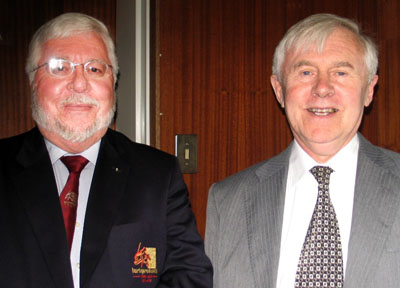Latest News Archive
Please select Category, Year, and then Month to display items
13 January 2020
|
Story Eugene Seegers
|
Photo Anja Aucamp
 Spearheading the digital expansion of the conversational Sesotho course is IDEAS Lab Director, Johann Möller (middle). With him are from the left: Prof Pule Phindane, CUT; Dr Brenton Fredericks, CUT; Bahedile Letlala, UFS Department of African Languages; and Dr Elias Malete, UFS Department of African Languages.
Spearheading the digital expansion of the conversational Sesotho course is IDEAS Lab Director, Johann Möller (middle). With him are from the left: Prof Pule Phindane, CUT; Dr Brenton Fredericks, CUT; Bahedile Letlala, UFS Department of African Languages; and Dr Elias Malete, UFS Department of African Languages.
For many years now, the UFS has been offering a one-year course in conversational Sesotho for staff members; this can then be followed up with the one-year course in advanced conversational Sesotho. The conversational Sesotho for students in the Faculty of Education was introduced in 2018 at the UFS.
The Central University of Technology (CUT) needed a conversational course for its first-year students and approached the Department of African Languages for the development of such a course. Living as we do in a multilingual country; this additional language skill opens doors and often hearts as well.
Using instructional design principles
However, the need was identified by both CUT and UFS to present this crucial information in a way that would be more appealing to digital natives as well as to those less familiar with technology. The Department of African Languages on the UFS Bloemfontein Campus, together with relevant departments from the CUT, approached the IDEAS Lab located on the UFS South Campus, since they already have a reputation for being a specialist on broadcasting and repackaging curricular content for digital presentations. The IDEAS Lab provided technical advice and built the multimedia programme, which will help the user to hear and practice phrases in Sesotho, using instructional design principles. The course will be available to both staff and students belonging to the two universities.
Room for growth
Johann Möller, Director of the IDEAS Lab, says this pilot programme will give both institutions the opportunity to test the use of multimedia for language acquisition. He adds, “Language is extremely complex, and we would like to expand this learning aid in the future.” In fact, the original design has room for growth built into it.
To keep things simple for the user and the building team, it was decided to start out with only four potential everyday scenarios where a staff member would like to speak Sesotho: Firstly, how to greet other persons from different genders; secondly, potential scenarios one might encounter in the university environment itself; thirdly, how to deal with situations at a hospital; and finally, how to use one’s language skills at a filling station.
Pronunciation is key
Each scenario contains three to four conversations that the learner can revise, along with images and audio that illustrate the situation and assist with correct pronunciation. The system does not allow the user to progress unless they have listened to the pronunciations of the sample sentences or phrases.
Further reading material and vocabulary lists are also provided, with the result that people who are using the programme can learn at their own pace. The authoring software Articulate Storyline was used to build the individual scenarios and each conversation or lesson within it. The lessons are also not dependent on an internet connection; they can be downloaded onto a flash memory drive and used offline.
First lecture in Law Dean's series presented
2010-10-22
 |
Prof. Johan Henning, Dean of the Faculty of Law at the UFS and Prof. Johan Farrar, a well respected Corporate Law Specialist, at the recent first lecture in the Law Dean’s Prestige Lecture Series.
Photo: Lize du Plessis
|
| Prof. John Farrar, a well respected Corporate Law Specialist of high international repute, delivered the first lecture in the Law Dean’s Prestige Lecture Series at the University of the Free State (UFS). The theme of his paper was Directors’ duties of care – Issues of classification, solvency and business judgement and the dangers of legal transplants.
The topic is of the utmost importance to South African lawyers in view of the very contentious provisions of the new Companies Act 71 of 2008 endeavouring to introduce the business judgement rule into South African Company Law if and thus reforming company directors’ common law duties of care and skill, if when this legislation at long last becomes operative.
Prof. Farrar is a professor of Corporate Governance at the University of Auckland Business School, and joint director of the New Zealand Governance Centre. These are part-time roles and the remainder of his time is spent as emeritus professor of Law at Bond University, Queensland.
Prof. Farrar has extensive experience in Commercial Law Reform, having, for example, acted as a consultant to the New Zealand Treasury, the Law Commission, the Business Council of Australia and the UK Department of Trade and Industry.
|